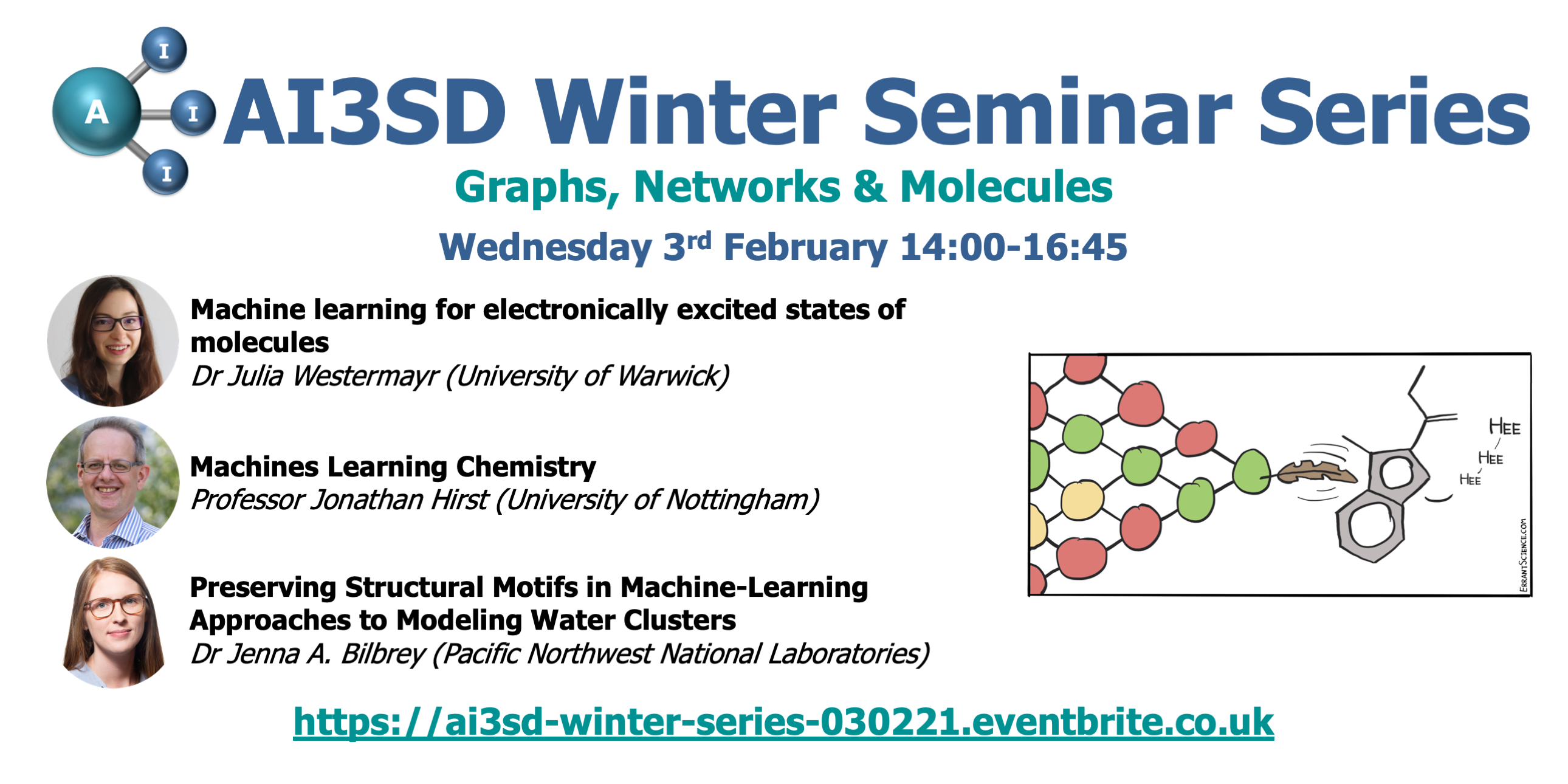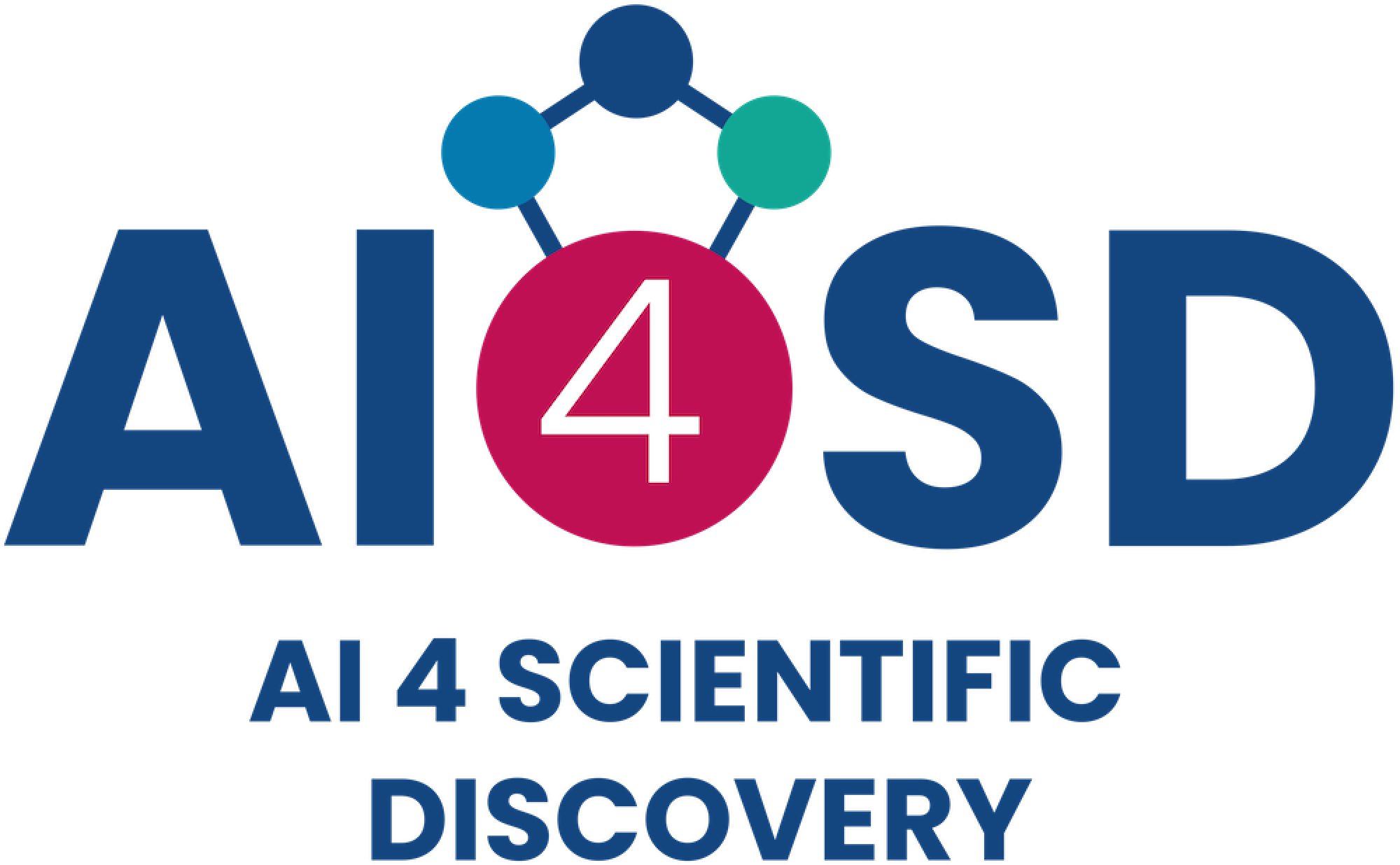
- This event has passed.
03/02/2021 – AI3SD Winter Seminar Series: Graphs, Networks & Molecules
3rd February 2021 @ 2:00 pm - 4:45 pm
Free
Eventbrite Link: https://ai3sd-winter-series-030221.eventbrite.co.uk
Description:
This seminar forms part of the AI3SD Online Seminar Series that will run across the winter (from November 2020 to April 2021). This seminar will be run via zoom, when you register on Eventbrite you will receive a zoom registration email alongside your standard Eventbrite registration email. Where speakers have given permission to be recorded, their talks will be made available on our AI3SD YouTube Channel. The theme for this seminar is Graphs, Networks & Molecules.
Agenda
- 14:00-14:45: Machine learning for electronically excited states of molecules – Dr Julia Westermayr (University of Warwick)
- 14:45-15:00: Coffee Break
- 15:00-15:45: Machines Learning Chemistry – Professor Jonathan Hirst (University of Nottingham)
- 15:45-16:00: Coffee Break
- 16:00-16:45: Preserving Structural Motifs in Machine-Learning Approaches to Modeling Water Clusters – Dr Jenna A. Bilbrey (Pacific Northwest National Laboratories)
Abstracts & Speaker Bios
- Machine learning for electronically excited states of molecules – Dr Julia Westermayr: An accurate simulation of the excited states of molecules can enable the study of many important processes that are fundamental to nature and the life forms we know, but these calculations are seriously limited by the high complexity and computational efforts involved. In this talk, I will discuss how machine learning algorithms can enable an efficient and accurate computation of photo-initiated reactions of molecules – from light excitation to nonradiative decay [1]. On the example of the methylenimmonium cation, I will introduce the SchNarc approach [2] and demonstrate the accuracy of its machine-learned potentials via UV/visible absorption spectra and nonadiabatic dynamics simulations [2,3]. Better statistics and long time-scale dynamics simulations become accessible with SchNarc, which would not be feasible without the help of ML [2-4].
[1] J. Westermayr, P. Marquetand, “Machine learning and excited-state molecular dynamics” Chem. Rev., in press, doi:10.1021/acs.chemrev.0c00749 (2020).
[2] J. Westermayr, M. Gastegger, P. Marquetand, “Combining SchNet and SHARC: The SchNarc machine learning approach for Excited-State Dynamics”, J. Phys. Chem. Lett. 11(10), 3828-3834 (2020).
[3] J. Westermayr, P. Marquetand, “Deep learning for UV absorption spectra with SchNarc: First steps towards transferability in chemical compound space”, accepted in J. Chem. Phys. (2020).
[4] J. Westermayr, M. Gastegger, M. Menger, S. Mai, L. González, P. Marquetand, “Machine learning enables long time scale molecular photodynamics simulations”, Chem. Sci. 10, 8100-8107 (2019).
Bio: I am a postdoctoral research fellow developing machine learning models to study photoplasmonic catalysis since Oct. 2020. My main goal is to enable computationally efficient and accurate nonadiabatic dynamics simulations by decoupling the costs of accurate quantum chemistry calculations from the dynamics simulations. Therefore, I aim to fit potential energy surfaces, forces, and related properties (dipole moments, nonadiabatic coupling vectors, electronic friction tensors,…) of molecules and materials based on first principle reference data. - Machines Learning Chemistry – Professor Jonathan Hirst: Reinvigorated by algorithmic developments, faster hardware and large data sets, machine learning is pervading many aspects of chemistry. We present two examples from our recent studies, one in the area of drug discovery, the other focused on protein spectroscopy. In the first, we consider pharmaceutical lead discovery as active search in a space of labelled graphs [1]. We extend a recent data-driven adaptive Markov chain approach, and evaluate it on a focused drug design problem, where we search for an antagonist of an ?v integrin, the target protein that belongs to a group of Arg-Gly-Asp integrin receptors. In the second example, we present a novel machine learning protocol that uses a few key structural descriptors to predict amide I IR spectra of proteins and agrees well with experiment [2]. Its transferability enabled us to distinguish protein secondary structures, probe atomic structure variations with temperature, and monitor protein folding.
[1] Oglic, D., Oatley, S.A., Macdonald, S.J.F., McInally, T., Garnett, R., Hirst, J.D. & Gärtner, T. Active search for computer-aided drug design. Mol. Inf., 2018, 37, 1700130. http://dx.doi.org/10.1002/minf.201700130
[2] Ye, S., Zhong, K., Zhang, J., Hu, W., Hirst, J.D., Zhang, G., Mukamel, S., Jiang, J. A transferable machine learning protocol for predicting protein amide-I infrared spectra. J. Am. Chem. Soc., 2020, 142, 19071. http://dx.doi.org/10.1021/jacs.0c06530
Bio: Professor Jonathan Hirst obtained his B.A. in chemistry from Oxford University in 1990. He received his Ph. D. from London University in 1993, under the supervision of Dr. Michael Sternberg at the Imperial Cancer Research Fund. He spent the following three years as a postdoctoral research associate in the United States with Professor Charles Brooks III, first at Carnegie Mellon University, Pittsburgh, and subsequently at The Scripps Research Institute, La Jolla, as a recipient of a Human Frontiers Long-term Fellowship. In 1996, he was promoted to Assistant Professor. In 1999, he was appointed as a Lecturer in Computational and Theoretical Chemistry at the University of Nottingham. In 2002, he was promoted to Reader and in 2004 to Professor in Computational Chemistry. In 2012, he became the Head of the Department of Physical and Theoretical Chemistry. In Aug 2013, he relinquished this role to become the Head of the School of Chemistry, concluding a four-year term in 2017. In 2020, he was awarded a Royal Academy of Engineering Chair in Emerging Technologies. - Preserving Structural Motifs in Machine-Learning Approaches to Modeling Water Clusters – Dr Jenna A. Bilbrey: Chemical structures are naturally viewed as collections of atoms connected through bonds, and graph theory provides a natural tool for capturing that intuition in a concrete mathematical fashion. Over the past several years, graph neural networks have become increasingly popular for modeling chemical systems. To build on this work, the multi-laboratory ExaLearn project, part of the DOE Exascale Computing Project, is developing novel capabilities that combine state-of-the-art machine-learning techniques with high-performance computing to enable the rapid exploration of chemical space on exascale-class systems. Water clusters offer an interesting use case for the development of machine-learning approaches that preserve intermolecular interactions and structural motifs. We apply a dataset of ~5 million hydrogen-bonded water clusters that display interesting long-range structural patterns to explore unique challenges in property prediction and molecular generation.
[1] J. A. Bilbrey, J. P. Heindel, M. Schram, P. Bandyopadyay, S. S. Xantheas, S. Choudhury. “A look inside the black box: Using graph-theoretical descriptors to interpret a Continuous-Filter Convolutional Neural Network (CF-CNN) trained on the global and local minimum energy structures of neutral water clusters,” J. Chem. Phys., 2020, 153, 024302.
[2] S. Choudhury, J. A. Bilbrey, L. Ward, S. S. Xantheas, I. Foster, J. P. Heindel, B. Blaiszik, M. E. Schwarting. “HydroNet: Benchmark Tasks for Preserving Long-range Interactions and Structural Motifs in Predictive and Generative Models for Molecular Data,” Machine Learning and the Physical Sciences workshop at NeurIPS, 2020.
Bio: Jenna (Bilbrey) Pope is a data scientist at Pacific Northwest National Laboratory. She graduated with her Ph.D. in chemistry from the University of Georgia in 2014, and now uses her knowledge of computational chemistry to explore machine-learning approaches for chemical systems. Code for her projects can be found at https://github.com/jenna1701.
